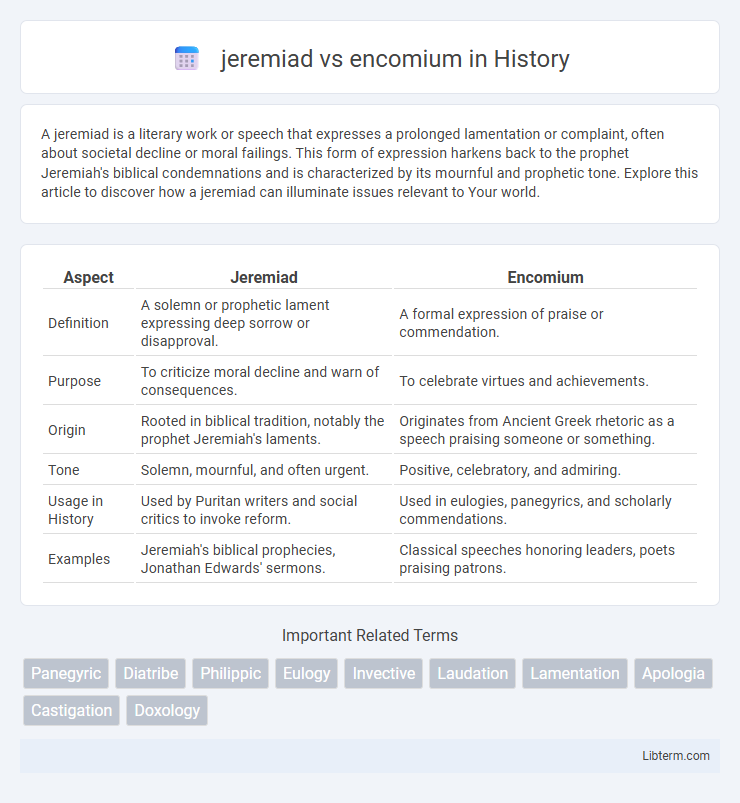A jeremiad is a literary work or speech that expresses a prolonged lamentation or complaint, often about societal decline or moral failings. This form of expression harkens back to the prophet Jeremiah's biblical condemnations and is characterized by its mournful and prophetic tone. Explore this article to discover how a jeremiad can illuminate issues relevant to Your world.
Table of Comparison
| Aspect | Jeremiad | Encomium |
|---|---|---|
| Definition | A solemn or prophetic lament expressing deep sorrow or disapproval. | A formal expression of praise or commendation. |
| Purpose | To criticize moral decline and warn of consequences. | To celebrate virtues and achievements. |
| Origin | Rooted in biblical tradition, notably the prophet Jeremiah's laments. | Originates from Ancient Greek rhetoric as a speech praising someone or something. |
| Tone | Solemn, mournful, and often urgent. | Positive, celebratory, and admiring. |
| Usage in History | Used by Puritan writers and social critics to invoke reform. | Used in eulogies, panegyrics, and scholarly commendations. |
| Examples | Jeremiah's biblical prophecies, Jonathan Edwards' sermons. | Classical speeches honoring leaders, poets praising patrons. |
Introduction to Jeremiad and Encomium
Jeremiad is a literary form characterized by a prolonged lamentation or complaint, often highlighting societal decline and calling for moral or spiritual reform, deeply rooted in prophetic traditions. Encomium, in contrast, is a formal expression of praise that celebrates the virtues, achievements, or qualities of a person, event, or concept, commonly used in rhetoric and ceremonial contexts. Understanding these forms helps in analyzing texts that either invoke a sense of warning and urgency or express admiration and honor.
Defining Jeremiad: Meaning and Origins
Jeremiad is a literary form rooted in the biblical prophet Jeremiah's laments, characterized by a prolonged expression of sorrow or complaint, often forecasting doom due to moral decline. Originating in Judeo-Christian traditions, it serves as a cultural critique emphasizing the consequences of societal or individual failings. This genre contrasts with encomium by focusing on lamentation and warning rather than praise and celebration.
Understanding Encomium: Meaning and Origins
Encomium is a rhetorical expression of high praise that originates from classical Greek and Latin traditions, often used in formal speeches and literature to honor individuals or deeds. Rooted in ancient performance contexts, encomia emphasize virtues, achievements, and noble qualities, creating an uplifting and celebratory tone. Understanding this tradition helps distinguish encomium from jeremiad, which serves a contrasting purpose of lamentation and moral critique.
Key Differences Between Jeremiad and Encomium
Jeremiad is a literary work or speech expressing deep lamentation or condemnation over societal decline, emphasizing warning and moral admonition, while encomium is a formal expression of praise, glorifying a person, event, or quality with admiration and celebration. Jeremiads often invoke themes of doom and societal failure to inspire reform, whereas encomia highlight virtues and achievements to celebrate excellence. The key difference lies in jeremiad's focus on critique and caution versus encomium's role in honoring and affirming value.
Historical Contexts: Use of Jeremiad
The jeremiad, originating from the biblical prophet Jeremiah's laments, became prominent in early American Puritan sermons during the 17th century as a means of addressing societal decline and moral failure. It served as a powerful rhetorical tool to warn communities about the consequences of straying from religious and ethical ideals, often predicting doom to provoke repentance. Historical contexts such as the Great Awakening utilized the jeremiad to inspire spiritual renewal and reinforce communal adherence to doctrinal purity.
Historical Contexts: Use of Encomium
In historical contexts, encomiums were traditionally used in ancient Greece and Rome to publicly praise individuals, often heroes or leaders, celebrating their virtues and accomplishments during civic ceremonies or political gatherings. This rhetorical form served to reinforce social values and communal identity by highlighting exemplary behavior and achievements. Encomiums also played a crucial role in medieval court culture, where they were employed to honor monarchs and nobles, solidifying loyalty and political alliances through elevated praise.
Literary Examples of Jeremiad
Jeremiads in literature famously include Jonathan Edwards's "Sinners in the Hands of an Angry God," which vividly warns of divine wrath and human sinfulness, and Mark Twain's "The Adventures of Huckleberry Finn," which critiques social injustices and moral decay. Nathaniel Hawthorne's works often embed jeremiadic themes, highlighting the failures of Puritan society and human frailty. These examples emphasize a mournful or cautionary tone, lamenting societal decline and urging moral reform.
Literary Examples of Encomium
Encomium is a rhetorical form characterized by high praise, often used to honor individuals, achievements, or virtues with poetic or eloquent language. Notable literary examples include Cicero's "In Catilinam," where he praises the Republic's resilience, and Milton's "Samson Agonistes," which lauds heroic strength and perseverance. Encomium appears in classical odes like Pindar's victory odes, celebrating athletic triumphs, and in Shakespearean speeches such as Mark Antony's funeral oration in Julius Caesar.
Impact on Rhetoric and Persuasion
Jeremiads intensify rhetoric by invoking dire warnings and moral urgency, compelling audiences to confront societal failures and inspiring reform through fear and accountability. Encomiums enhance persuasion by celebrating exemplary virtues or achievements, fostering admiration and aligning listeners with positive ideals to motivate continued excellence. Both forms strategically shape emotional appeals--jeremiads through cautionary narratives and encomiums through commendation--maximizing influence on audience attitudes and behaviors.
Modern Applications of Jeremiad and Encomium
Modern applications of the jeremiad appear prominently in political speeches and social critiques, where speakers emphasize societal decline to motivate reform and awareness. Encomiums are widely used in contemporary settings such as award ceremonies, eulogies, and corporate recognition events to celebrate achievements and highlight exemplary qualities. Both rhetorical forms serve strategic purposes: the jeremiad invokes urgency and moral reflection, while encomium fosters admiration and positive reinforcement.
jeremiad Infographic

 libterm.com
libterm.com